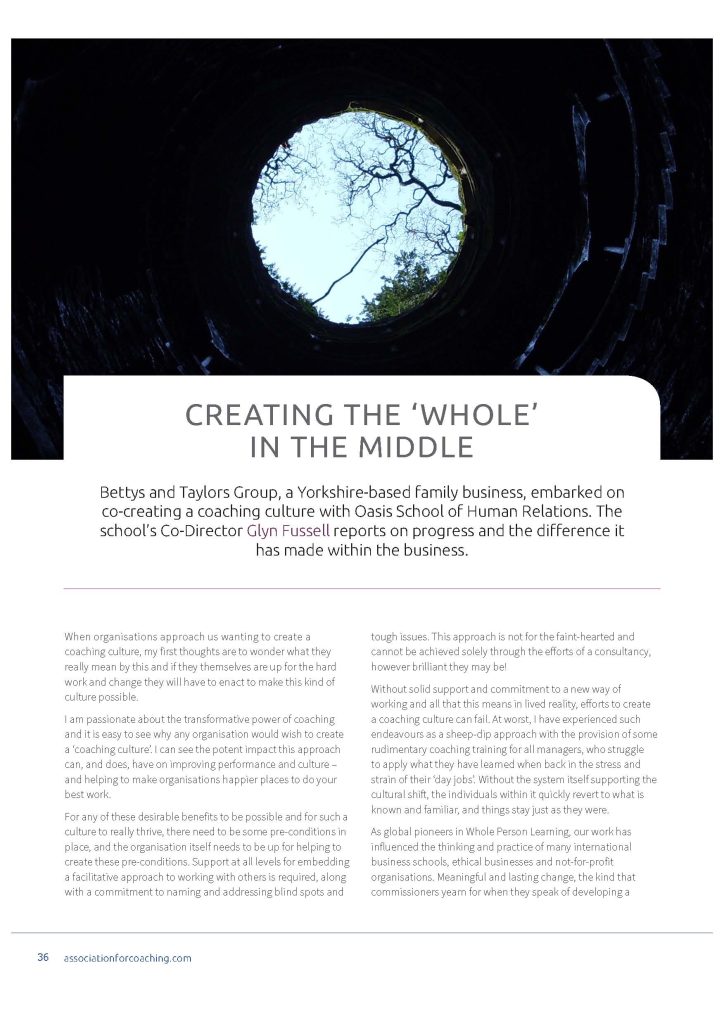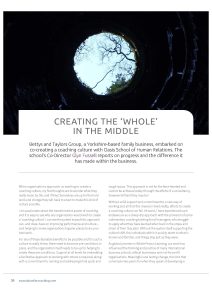Co-director Glyn Fussell wrote up the progress of the Co-creating a Coaching Culture initiative and its impact on the business for Coaching Perspectives magazine in January 2019.

When organisations approach us wanting to create a coaching culture, my first thoughts are to wonder what they really mean by this and if they themselves are up for the hard work and change they will have to enact to make this kind of culture possible.
I am passionate about the transformative power of coaching and it is easy to see why any organisation would wish to create a ‘coaching culture’. I can see the potent impact this approach can, and does, have on improving performance and culture – and helping to make organisations happier places to do your best work.
For any of these desirable benefits to be possible and for such a culture to really thrive, there need to be some pre-conditions in place, and the organisation itself needs to be up for helping to create these pre-conditions. Support at all levels for embedding a facilitative approach to working with others is required, along with a commitment to naming and addressing blind spots and tough issues. This approach is not for the faint-hearted and cannot be achieved solely through the efforts of a consultancy, however brilliant they may be!
Without solid support and commitment to a new way of working and all that this means in lived reality, efforts to create a coaching culture can fail. At worst, I have experienced such endeavours as a sheep-dip approach with the provision of some rudimentary coaching training for all managers, who struggle to apply what they have learned when back in the stress and strain of their ‘day jobs’. Without the system itself supporting the cultural shift, the individuals within it quickly revert to what is known and familiar, and things stay just as they were.
As global pioneers in Whole Person Learning, our work has influenced the thinking and practice of many international business schools, ethical businesses and not-for-profit organisations. Meaningful and lasting change, the kind that commissioners yearn for when they speak of developing a coaching culture, is in our experience only brought about by engaging with the whole person – head, heart and soul. And also engaging with the systems they are a part of. This deep, personal and systemic engagement is what makes the real difference, yet it is rare to find an organisation that recognises that to be fit for the future requires such an engagement on their part.
With that in mind, a genuine partnership approach to creating a coaching culture takes great courage on the part of the commissioning organisation. Fundamentally, it means a real and wholehearted shift away from a command and control model, to one which authentically empowers employees to influence the emergence of a culture that benefits both people and the bottom line. Our first step is to enable the organisation to take an unflinching look at its existing culture, and to consider the future picture they want to create together. Otherwise, all our efforts as consultants, coaches and facilitators can go towards helping people fit into an unhealthy culture that serves the few.
[panel]
Whole Person Learning
Whole Person Learning works with all aspects of the person – the intellectual, emotional, physical and spiritual. It takes account of the relationships a person holds and the systems they are a part of. It is a transformative approach to education and learning that the Oasis School of Human Relations has pioneered and developed over 30 years of practice in an organisational, team and individual development.
Its origins stretch back to the roots of humanistic psychology, recognising that if learners are wholeheartedly engaged in their own learning then that learning will be applied more fully and lived more unreservedly. Visit Our Approach for more information.
[/panel]
Since 2008, the Oasis School of Human Relations has worked in a dynamic, supportive and challenging partnership with an organisation that has been willing to go on such a journey, a successful family business where the commitment to developing people as the primary driver for change is thorough, widely understood and supported at all levels.
One group, who we have worked with, the Bettys and Taylors Group is a UK-based producer of tea and coffee, with a number of iconic tea rooms running alongside the internationally renowned Yorkshire Tea brand. Oasis has partnered with them to develop a culture that embeds and values honest, adult-to-adult conversation and an environment where managers and leaders are expected to coach and mentor those they lead. Our work has been at all levels, including the board and with family shareholders. The way of leading and managing at Bettys and Taylors (referred to internally as the ‘BTG Way’) has been co-created through a series of interwoven initiatives which include building resilience for managing change, relational leader development programmes, and the introduction of a highly successful internal coaching and mentoring provision which supports and develops hundreds of staff across the business.
This innovative internal coaching scheme is a major part of the foundation upon which the coaching culture has been built. It was introduced after we provided several years of coaching for key individuals and for those in major transition. These people, having worked with experienced Oasis coaches, became some of the strongest champions for taking a facilitative coaching approach, with a significant number wanting to learn these skills for themselves. Thanks to the open-mindedness of the organisation and its real desire to invest in a culture fuelled by learning and development, Bettys and Taylors Group started to reap many business benefits, and employees at all levels began to feel able to play an active part in forging the future of their organisation. The internal coaching scheme goes beyond traditional performance coaching, using a strongly relational model of helping others to bring more of their whole selves to the demands of a fast-moving business. The scheme has enabled a new reach for cultural change at all levels within the business, with more and more ‘internal clients’ stepping up in their role performance and finding the courage and impetus to put themselves forward for promotions and new opportunities within the business. The impact has also been felt and reported by the direct reports of those who have trained as coaches, and who are experienced as more effective, more supportive and more collaborative in their approach.
Lindsay Botto, Operations Director for the Group’s tea and coffee brand, Taylors of Harrogate, was involved from the outset. She says: ‘As an organisation, we were asking – how do we develop more self-direction, self-management and self-awareness? Where do we provide the space to consider the future of individuals’ roles and their areas for development?’
Working closely with the business, we designed a modular programme – Coaching and Mentoring with Head, Heart and Soul – and looked for volunteers from within the business whose passion for the development of others would make them perfect candidates to be internal coaches. The chief executives of the Group agreed on a commitment of two days a month of these trainee coaches’ time in order for them to meet clients, attend supervision and undertake continual professional development. It is a lot to ask, and by and large, those who came forward were senior people, whose day jobs are busy and important to the business. The move towards such a significant investment heralded a new chapter towards creating an enabling coaching culture and sent a strong affirmative message to the whole organisation.
Within the workforce of more than 1,400 people, twenty internal coaches have been through the development programme so far. Between them, they have reached over 150 members of staff deeper within the business, who are free to access the scheme in agreement with their line manager. One of the internal coaches said: ‘I find it really rewarding to see the changes in people. What I hadn’t anticipated is the impact my learning would have on my wider role… I have found more of a voice through the use of effective questioning and I am also able to listen much more, picking up patterns and themes that passed me by previously.’
Key to the ongoing success of the internal coaching scheme has been the self-confidence that the internal coaches have gained through the extensive experiential learning programme they have undertaken. This programme has now been accredited to the Certificate level by the Association for Coaching. This, along with regular supervision and CPD, has meant that the positive impact continues to be felt across the organisation. The value to the business has been seen through higher levels of productivity and effectiveness in the role and career development. The cultural impact is priceless, with internal coaches seen as leading culture carriers and role models ensuring that new ways of working are understood and embedded through their relationships with their internal clients.
Finding an organisational partner who is willing to approach culture in this way is rare. This way of working is significantly different from anything I have experienced before in my work as a coach and consultant. For me, this radical peer-based approach, working in relationship with others and acknowledging the importance of the whole person, rather than relying on a well-trodden pathway or approach, represents a new paradigm for business culture. This goes beyond simply training and into whole organisational development. It is why this integrated and courageous approach has been so successful and actually leads to reportable cultural change.


Creating a Coaching Culture
If you are looking to create a Coaching Culture in your business, Oasis can help with this. Contact our leadership team and we can work with you to co-create a coaching culture.











